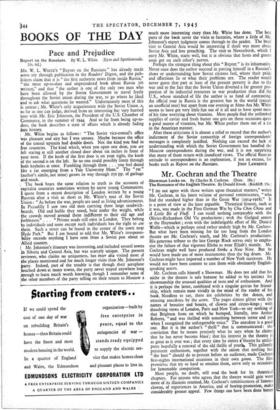BOOKS OF THE DAY
Pace and Prejudice
MR. W. L. WHITE'S "Report on the Russians" has already made some stir through publication in the Readers' Digest, and the pub- lishers claim that it is "the first authentic news from inside Russia," "the most up-to-date and unprejudiced book about Russia yet Written," and that "the author is one of the only two men who have been allowed by the Soviet Government to travel freely throughout the Soviet union during the war, to go where he liked and to ask what questions he wanted." Unfortunately most of this is untrue ; Mr. White's only acquaintance with the Soviet Union .s, so far as one can judge, derived from an interesting but very hurried tour with Mr. Eric Johnston, the President of the U.S. Chamber of Commerce, in the summer of 1944. And so far from being up-to- date, the book describes a state of affairs which is already fading Into history.
Mr. White begins as follows: "The Soviet vice-consul's office was pleasant and airy but I was uneasy. Maybe because the office of the consul upstairs had double doors. Not the kind you find in free countries. The kind which, when you open one door, you are left staring at still another closed door about six inches in front of your nose. If the knob of the first door is on your right, the knob of the second is on the left. So no one could possibly listen through both keyholes at once. Fumbling through them . . . you feel dazed like a rat emerging from a Yale University Maze." The " rat " (author's simile, not mine) gnaws its way through 250 pp. of garbage and muck.
, The book bears the same relation to truth as the accounts of capitalist countries sometimes written by naive young Communists. I quote from a recent description of London written by a young Russian after a visit as short as Mr. White's tour of the Soviet Union: "As before the war, people are used as living advertisements. In Piccadilly I saw two old men carrying three large sandwich- boards. Old and feeble they stood, bent under the weight, while the crowds moved around them indifferent to their old age and feebleness." . . . "Private roads still exist in London. They belong to individuals and none except such individuals has the right to use them. Such a street can be found in the centre of the town near Hyde Park." But I am bound to add that Mr. White's irresponsi- bility exceeds anything I have seen from a Soviet pen about an Allied country.
Mr. Johnston's itinerary was interesting, and included several towns In Siberia and Central Asia, but was scarcely unique. The present reviewer, who chitin no uniqueness, has inter alia visited most of the places mentioned and for much longer visits than Mr. Johnston's Party. Indeed, part of the trouble is that though their aeroplane ,touched down at many towns, the party never stayed anywhere long ,enough to learn much worth knowing, though I remember some of the other members of the party telling on their return to Moscow a much more interesting story than Mr. White has done. The best parts of the book cover the visits to factories, where a little of Mr.
Johnston's expert judgment comes through to the pader. The brief visit to Central Asia would be interesting if there was more about Soviet Asia and less preaching. The visit to Novosibirsk, which I envy Mr. White, starts well, but it is obvious that hosts and guests soon got on each other's nerves.
Perhaps the strangest thing about this " Report " is its inhumanity. Never once does the author succeed in putting himself in a Russian's shoes or understanding how Soviet citizens feel, where their pride and affections lie or what their problems are. The reader would never guess that part at least of the present poverty is due to the war and to the fact that the Soviet Union diverted a far greater pro- portion of its industrial resources to war production than did the U.S., whose standard of life the author is so fond of contrasting. An official tour in Russia is the greatest fun in the world (except an unofficial tour) but apart from one evening at Almo Ata Mr. White seems to have got very little fun out of it all and to have spent most of his time worrying about Vitamins. Most people find the unlimited supplies of caviar and fresh butter one gets on these occasions quite a good source of vitamins, but Mr. White prefers them out of a tin in the American manner.
After these criticisms it is almost a relief to record that the author's indictment of the Soviet censorship of foreign correspondents' messages is completely justified. Nothing can exceed the lack of understanding with which the Soviet Government has handled the Moscow correspondents during the war, and it is not surprising that many of them return with jaundiced views. The official Russ:an attitude to correspondents is an explanation, if not an excuse, for books such as Report on the Russians. JOHN LAWRENCE.






























 Previous page
Previous page